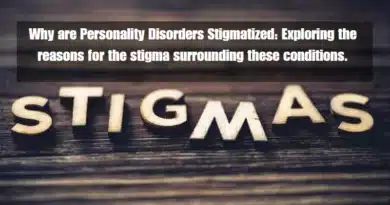Narcissistic Abuse: Signs, Causes, and Best Treatment Options
Takeaways
| Category | Details |
|---|---|
| What it is | A form of emotional abuse where the abuser seeks power and control over the victim through manipulation and tactics like gaslighting, isolation, and verbal abuse. |
| Signs in the abuser | Grandiosity, lack of empathy, needing constant admiration, and a sense of entitlement. |
| Signs in the victim | Low self-esteem, self-doubt, confusion, anxiety, depression, difficulty trusting others, and isolation. |
| Effects | Narcissistic abuse can have severe consequences for the victim’s mental and emotional well-being, and may even lead to PTSD. |
| Recovery | Therapy, support groups, self-care practices, and setting boundaries can help victims heal and rebuild their lives. |
What is Narcissistic Abuse?
Narcissistic abuse refers to a behavior pattern where an individual has narcissistic traits. Or someone diagnosed with Narcissistic Personality Disorder (NPD) exerts control and manipulation over another person. They typically exert control and manipulation through emotional and psychological abuse.
This type of abuse often involves the abuser of power, control, and domination over the victim. And can manifest in various ways, including:
- Invalidating or belittling the victim’s thoughts, feelings, and experiences
- Blaming the victim for the abuser’s behavior
- Gaslighting the victim to make them question their perceptions and memories
- Using the victim’s vulnerabilities or insecurities against them
- Isolating the victim from friends and family
- Making the victim feel guilty or ashamed for their own needs and wants
- Threatening or using physical, emotional, sexual, or financial abuse
Narcissistic abuse can be particularly damaging as it can cause significant harm to a person’s mental health, self-esteem, and overall well-being. Narcissistic abuse often has long-lasting effects on the victim even after the relationship ends.
Examples Of Narcissistic Abuse
Narcissistic abuse is a sort of psychological abuse that may leave profound and enduring scars on its victims. It is a pattern of behavior that seeks to control, manipulate, and exploit those around the narcissistic individual for their benefit. While everyone has some narcissistic traits, actual narcissistic personality disorder (NPD) is a recognized mental health problem. The definition of NPD is an exaggerated feeling of ego and pity for others.
Narcissistic abuse can take many forms, from emotional and psychological manipulation to physical violence. Here are some instances of narcissistic abuse:
A. Gaslighting
It is a manipulative tactic commonly used by narcissistic abusers to control and confuse their victims. Gaslighting involves denying or manipulating information that causes the victim to doubt their perceptions, memories, and sanity. “Gaslighting” originates from a 1938 play and its subsequent film adaptations. In the play, a husband manipulates his wife’s sense of reality by dimming the gaslights in their home.
Narcissistic abusers often use Gaslighting to maintain power and control over their victims. By making the victim doubt their reality, the abuser can gaslight them into submission. Gaslighting can take many forms, including denying events or statements. The victim remembers what happened, questioning the victim’s memory and manipulating the victim’s perception of reality.
Gaslighting can have severe consequences for the victim’s mental health and well-being. Victims of gaslighting may experience anxiety, depression, and a loss of self-esteem. They may also feel lonely and isolated, as they may not trust their perceptions or feel they can confide in others.
B. Emotional Blackmail
Emotional blackmail is a common tactic used by narcissistic abusers to maintain power and control over their victims. This form of manipulation can be difficult to identify. It can significantly impact a person’s mental health and well-being.
1. What is Emotional Blackmail?
It is a form of psychological manipulation. In it, one person uses guilt, fear, or obligation to control another person’s behavior. The person using emotional blackmail may threaten to withhold love, support, or other positive behaviors unless the victim complies with their demands.
In the context of narcissistic abuse, emotional blackmail can take many forms. For example, the abuser may threaten to leave the victim or withhold affection unless they comply with their demands. They may also use guilt or shame to make the victim feel responsible for the abuser’s emotions or behaviors.
2. How Abusers Use Emotional Blackmail in Narcissistic Abuse?
Narcissistic abusers may use emotional blackmail to maintain power and control over their victims. They may use threats, manipulation, or guilt to force the victim to comply with their demands or to keep them in fear or anxiety.
One common tactic used by narcissistic abusers is the use of silent treatment. The abuser may refuse to speak to the victim or acknowledge their presence to punish them for not complying with their demands. Emotional blackmail can be incredibly damaging to a person’s mental health. It might lead to sentiments of worthlessness and abandonment.
Another tactic used by narcissistic abusers is the use of love bombing. Love bombing is a form of manipulation in which the abuser shows the victim attention and affection to gain their trust and control. Once the victim is emotionally invested in the relationship, the abuser may use emotional blackmail to maintain their power.
3. How to Protect Yourself from Emotional Blackmail?
If you are experiencing emotional blackmail in the context of narcissistic abuse, it’s essential to seek support from a therapist or other mental health professional. A therapist can help you recognize the signs of emotional blackmail and develop strategies to protect yourself from its impact.
Some strategies that may be helpful include setting clear boundaries with the abuser, practicing self-care, and surrounding oneself with supporting relatives and friends. It’s also important to remember that emotional blackmail is a form of abuse, and you do not deserve this treatment.
C. Projection
It is a common tactic used by narcissistic abusers to shift blame onto their victims. The abuser may project negative traits onto the victim, such as lying, cheating, or being controlling. Projection can be confusing and disorienting for the victim, who may doubt their perceptions and feel guilty for things they haven’t done.
For example, if the narcissistic abuser is cheating on their partner, they may accuse their partner of cheating instead. By doing so, the abuser can deflect attention from their actions and make the victim feel like they are the problem. The victim may question their fidelity and feel guilty for something they haven’t done.
Another purpose of projection is to control the victim’s feelings. For instance, the abuser may project their fears and insecurities onto the victim, making them feel responsible for the abuser’s emotional well-being. The victim may feel like they must constantly reassure the abuser or accommodate their needs, even if it comes at the expense of their well-being.
Recognizing projection can be an essential step in breaking free from narcissistic abuse. It is necessary to learn to identify when the abuser is projecting their issues onto the victim. Victims should learn to regain their sense of self and set boundaries to protect their well-being. Seeking support from a therapist or other mental health professional can be helpful in this process.
D. Triangulation
Narcissistic abusers use triangulation tactics to create tension and jealousy between two or more individuals. The abuser typically brings a third person into a relationship or conversation to gain power and control over the situation.
For example, a narcissistic abuser may tell their partner they have a close relationship with someone else, such as an ex-partner or a coworker. This can make the partner jealous or insecure, leading to arguments or conflict. The abuser may then use this tension to maintain power and control over the partner, using the third person to manipulate and exploit the situation.
Sometimes, the third person may know the narcissistic abuser’s tactics. They may even collude with them to maintain their power and control. This can create a toxic and unpleasant dynamic that might be difficult to escape.
E. Physical Abuse
It can occur in relationships where one partner exhibits narcissistic traits. In these cases, the narcissistic partner may use physical violence to maintain power and control over the victim. This can include hitting, slapping, punching, or other physical violence.
Important note: Physical abuse is never acceptable and is always a sign of an unhealthy and potentially dangerous relationship. Additionally, physical abuse is often accompanied by emotional and psychological abuse. The abuser may use manipulation and control tactics to maintain power over the victim.
F. Verbal Abuse
It is a common form of narcissistic abuse. Verbal abuse involves using words and language to control, manipulate, and degrade the victim. Narcissistic abusers may use insults, belittling comments, and other verbal aggression to diminish the victim’s sense of self-worth. Through these tactics, they maintain power and control over them. This abuse can seriously affect the victim’s mental and emotional well-being.
G. Isolation
It is a common tactic used by narcissists in their abuse of others. It is a means through which the narcissist takes control over their victim. They cut victims off from their support system, making them reliant on the narcissist for everything.
There are several ways in which a narcissist may isolate their victim:
- Physical Isolation: The narcissist may physically prevent their victim from leaving the house or going alone. They may also move to a remote location where the victim cannot access family or friends.
- Emotional Isolation: The narcissist may use emotional manipulation to make the victim feel like they cannot trust anyone but the narcissist. They may also make the victim feel like they are the only persons who know and understand them.
- Social Isolation: The narcissist may try to remove their victim from their social network by belittling their friends and family. They make the victim feel like they are better off without them.
- Financial Isolation: The narcissist may control the victim’s finances, making them reliant on the narcissist for everything.
- Hoovering: This is when the abuser tries to win back the victim after they have been discarded.
Overall, isolation is a powerful tool for narcissists to maintain control over their victims. Narcissistic abuse may have severe impacts on its victims. It is essential to recognize the signs of this type of abuse and to seek help.
Signs And Symptoms Of Narcissistic Abuse
Here are the common symptoms of narcissistic abuse reported by victims:
- Low self-esteem: Narcissistic abuse can damage your self-esteem and make you feel inferior.
- Isolation: A narcissistic abuser may try to isolate you from friends and family, making you feel alone and vulnerable.
- Guilt and shame: Narcissistic abusers often use guilt and shame as a form of manipulation, making you feel responsible for your behavior.
- Anxiety and depression: Victims of narcissistic abuse may experience anxiety, depression, and other mental health issues.
- Obsessive thoughts: Victims may become obsessed with their abuser, constantly thinking about them and their behavior.
- Difficulty trusting others: Narcissistic abuse can make it hard to trust others, as you may fear getting hurt again.
- Emotional detachment: Victims may become emotionally detached as a coping mechanism, disconnecting from their feelings and experiences.
- Physical symptoms: Some victims of narcissistic abuse may experience physical symptoms, such as headaches, stomach problems, and fatigue.
- Hypervigilance: Victims may become hypervigilant, always on guard for potential threats or abuse.
- Self-doubt: Narcissistic abusers often make their victims doubt their abilities and judgment, which leads to insecurity and self-doubt.
A. A Few Examples
- Your abuser constantly criticizes you, even for small things. This can be done subtly, such as making backhanded compliments or putting you down in front of others.
- Your abuser is extremely jealous and possessive. They may accuse you of cheating or flirting, even when no evidence supports their claims.
- Your abuser tries to prevent you from seeing your friends and family. They may comment negatively about your loved ones or try to prevent you from seeing them.
- To get you to question your sanity, your abuser utilizes gaslighting. They may deny things that happened or tell you you are imagining things.
- Your abuser threatens to harm you or someone you love if you leave them. This can be done either verbally or physically.
Causes of Narcissistic Abuse
Abuse of the mind and emotions occurs when a person is selfish. Individuals use their power or influence to manipulate, control, and demean their partners or others around them. This abuse is prevalent and affects many people, especially those in romantic relationships.
A. Being Cheated in Love
Being cheated in love can be a significant cause of developing narcissistic tendencies. A personality condition’s characteristics are narcissism, an inflated sense of one’s importance. It also includes a need for continual praise and a lack of compassion for others. While there is no single cause of narcissism, being cheated in love can trigger a series of events that can lead to the development of this personality disorder.
One of the main reasons why being cheated in love can lead to selfish behavior is the experience of betrayal. When someone gets cheated on, they may feel intense emotional pain, humiliation, and anger. They could feel mistreated as a result of this and that they deserve compensation for the pain they have endured. They may become obsessed with getting revenge or seeking justice, becoming more self-centered and less empathetic toward others.
Additionally, the experience of being cheated on can damage an individual’s self-esteem and self-worth. They may question their value and worth and feel like they are not good enough for anyone. To compensate for these feelings of inadequacy, they may develop a grandiose sense of self-importance, where they feel better than others and deserve more than they are getting. This can lead to entitlement and a lack of empathy toward others.
Furthermore, the experience of being cheated on can also trigger feelings of insecurity and fear of abandonment. They may begin to believe they are unlovable and that everyone will eventually cheat on them. This can lead to a need for constant attention and validation, which can make them more self-centered and less concerned with the needs and feelings of others.
B. Childhood Trauma
Childhood trauma may correlate with narcissistic abuse, including physical, emotional, and sexual abuse. Children who grow up in a setting without satisfying their emotional needs are exposed to harmful behaviors. For instance, neglect or abuse are more likely to develop personality disorders like narcissism.
C. Emotional Insecurity
Individuals who suffer from deep-seated emotional insecurity often need to control and manipulate others to feel better about themselves. They may also use emotional abuse as a means of control to maintain power and dominance over their partner.
D. Societal Norms
Some cultures praise narcissism and selfish conduct. This can result in individuals growing up with a heightened sense of entitlement and grandiosity, leading to narcissistic traits manifesting in abusive behavior.
E. Lack of Empathy
Narcissistic individuals lack empathy and are unable to connect with the emotions and needs of others. They often cannot see beyond their needs and desires, leading to abusive behavior towards their partners.
F. Fear of Abandonment
Narcissistic individuals often fear abandonment and will go to great lengths to prevent it. It includes using emotional abuse as a means of control. They may also use the fear of abandonment as a means of manipulation to get their partner to comply with their demands.
G. Research on Causes of Narcissistic Abuse
In recent years, researchers have begun to explore the role of trauma in the development of narcissistic personality disorder and narcissistic abuse. Some studies have shown that people with NPD are more likely to have experienced childhood trauma, such as physical or sexual abuse, neglect, or emotional abuse.
Other research has suggested that narcissistic abuse may be a form of intergenerational trauma. This means that the trauma experienced by a parent or caregiver can be passed down to their children. For example, a child a narcissistic parent raises may learn to adopt narcissistic behaviors.
It is important to note that trauma is not the only cause of narcissistic personality disorder or abuse. However, the research on trauma and narcissism is still in its early stages, and trauma likely plays a role in many cases.
Narcissistic abuse is a complex issue with several underlying causes. Understanding the root causes of this behavior can help identify and address it.
Treatment Options for Narcissistic Abuse
A. Therapy and Counseling
It can provide victims with a safe and supportive space to process their experiences, emotions, and thoughts. Therapy can help victims better understand how they were affected by the abuse. It also helps them develop coping strategies to overcome the trauma.
The therapy process begins with an initial assessment, where the therapist evaluates the victim’s symptoms, history, and goals for therapy. The victim’s requirements are thought about while developing a customized treatment plan.
B. CBT
The therapy process typically involves discussing the victim’s experiences and feelings about the abuse. Therapists may use various techniques. They include cognitive-behavioral therapy (CBT), psychodynamic therapy, and mindfulness-based therapies to help victims process their trauma.
Cognitive-behavioral therapy (CBT) is a popular therapeutic approach that helps individuals change negative thought patterns and behaviors that result from trauma. In CBT, the therapist works with the victim to identify negative thoughts and behaviors and develop positive alternatives.
C. Psychodynamic therapy
Psychodynamic therapy is another approach that focuses on exploring the victim’s unconscious thoughts and feelings related to the abuse. This technique can help victims identify patterns of behavior that contribute to their trauma.
D. Mindfulness-based therapies
Mindfulness-based therapies, such as meditation and yoga, can also help victims reduce anxiety and depression related to abuse. These techniques can help victims become more present at the moment and learn to control their thoughts and emotions.
It is important to note that therapy and counseling can be long-term. The intensity of the abuse will determine how long the treatment will last and the victim’s personal goals. Victims may also choose to attend group therapy, which can provide them with a sense of community and support.
E. Support Groups
Collaborating with people in a support group who have experienced similar experiences can provide a sense of community, validation, and comfort.
- Narcissistic Abuse Recovery Program (NARP): A self-healing program designed to help victims overcome the effects of narcissistic abuse.
- Co-dependents Anonymous (CoDA): Co-dependency sufferers might benefit from this 12-step program. It can result from being in a relationship with a selfish person.
- Narcissistic Abuse Recovery Support (NARS): An organization that assists people with narcissistic abuse.
- One Moms Battle: A group supporting mothers dealing with narcissistic ex-partners in child custody cases.
- The Invisible Scar: A website and support group for adult children of narcissistic parents.
- Narcissistic Abuse Survivor Support: A Facebook group that provides a safe space for survivors of narcissistic abuse. Also, to share their stories and connect with others who have been through similar experiences.
F. Medications
Doctors prescribe medications to manage symptoms of depression, anxiety, or PTSD. A trained mental health practitioner usually prescribes these drugs.
G. Self-care
Practicing self-care can help you build self-confidence, self-worth, and self-respect. It may include mindfulness meditation, exercise, and healthy eating habits.
H. Setting boundaries
Learning to set boundaries and saying no to abuse can be empowering and helpful in preventing further abuse.
I. No contact
Sometimes, the best action is to cut off all contact with the abuser, which can help avoid further emotional distress.
J. Legal action
Legal action may be necessary in some cases, especially if the abuse involves physical harm or financial exploitation.
K. Latest and Rare Treatments
In addition to these traditional treatments, several rare and innovative treatment options may be helpful for narcissistic abuse. Some of these treatments include:
- Somatic Experiencing (SE): SE is a body-based approach to therapy that can help people process and heal from trauma. SE involves attention to the body’s sensations and feelings to identify and release trapped trauma.
- Eye Movement Desensitization and Reprocessing (EMDR): EMDR is a type of therapy that uses eye movements to help people process and heal from trauma. EMDR is effective for various trauma-related disorders, including narcissistic abuse.
- Neurofeedback: Neurofeedback is a therapy that uses brainwave monitoring to help people learn to regulate their brainwaves. Neurofeedback is effective for various mental health conditions, including narcissistic abuse.
It is important to note that these rare and innovative treatments are not yet widely available. However, if you struggle to find effective treatment for narcissistic abuse, these options may be worth considering.
FAQ
What is narcissistic abuse?
It is a form of emotional abuse in which the abuser seeks to exert power and control over the victim. It can happen in various relationships, including romantic, family, and work.
What are the signs of narcissistic abuse?
Signs of narcissistic abuse may include gaslighting, manipulation, belittling, constant criticism, and controlling behavior.
Can narcissistic abuse lead to physical abuse?
Yes, in some cases, narcissistic abuse can escalate to physical abuse.
Can a person recover from narcissistic abuse?
Yes, a person can recover from narcissistic abuse with the help of therapy, support groups, and self-care.
What is gaslighting?
Gaslighting is a tactic used by narcissistic abusers to make their victim question their reality and sanity.
What is triangulation?
Triangulation is a tactic used by narcissistic abusers to create conflict between two or more people, often to divert attention from their behavior.
Can narcissistic abuse cause PTSD?
Yes, narcissistic abuse can cause post-traumatic stress disorder (PTSD) in some victims.
How can I protect myself from narcissistic abuse?
You can protect yourself from narcissistic abuse by setting boundaries, trusting your instincts, and seeking support from friends, family, or a therapist.
Can narcissistic abuse be generational?
Yes, narcissistic abuse can be generational, passed down from generation to generation.
Is narcissistic abuse only present in romantic relationships?
No, narcissistic abuse can happen in any relationship, including family and work.
Why is it hard to leave a relationship with a narcissistic abuser?
It is hard to leave a relationship with a narcissistic abuser because they often manipulate their victim into thinking they are the problem. And the abuser is the solution.
Can a person be both a victim and a perpetrator of narcissistic abuse?
Yes, in some cases, someone who has experienced narcissistic abuse may become a perpetrator of the same behavior.
Can narcissistic abuse be a result of a mental health disorder?
Yes, narcissistic abuse can result from a mental health disorder like a narcissistic personality disorder.
Can a person who has experienced narcissistic abuse ever trust again?
Yes, with the help of therapy and self-care, a person who has experienced narcissistic abuse can learn to trust again.
How can I support someone who has experienced narcissistic abuse?
You can support someone who has experienced narcissistic abuse by listening to them, validating their experiences, and helping them access resources—for instance, therapy or support groups.
What is ‘Gaslighting’ in the context of narcissistic abuse?
Gaslighting is a manipulative tactic where the narcissist distorts or denies reality, causing the victim to doubt their own perceptions, memories, or sanity. Over time, this leads to confusion, reduced self-esteem, and increased dependency on the abuser for a sense of reality. For example, a narcissist may deny events that have occurred or accuse the victim of being overly sensitive, thereby undermining the victim’s confidence in their own experiences.
Can you explain the term ‘Love Bombing’?
‘Love bombing’ refers to the initial phase in a relationship with a narcissist, characterized by excessive flattery, attention, and affection aimed at quickly building a deep emotional connection. This overwhelming display of adoration is designed to make the victim feel special and indispensable, fostering dependency. Once the victim is emotionally invested, the narcissist often shifts to manipulative and controlling behaviors.
What does ‘Triangulation’ mean in narcissistic relationships?
Triangulation involves the narcissist introducing a third party into the relationship dynamic to manipulate and control the victim. This can manifest as comparing the victim to others, sharing private information without consent, or creating jealousy and competition. The goal is to destabilize the victim, foster insecurity, and maintain power by keeping the victim off-balance and vying for the narcissist’s approval.
What is the ‘Silent Treatment,’ and how do narcissists use it?
The ‘Silent Treatment’ is a form of emotional manipulation where the narcissist deliberately ignores or withdraws from the victim, refusing to communicate. This tactic serves to punish the victim, assert control, and elicit feelings of unworthiness and anxiety. The lack of communication can leave the victim seeking ways to regain the narcissist’s attention and favor, thereby reinforcing the narcissist’s dominance in the relationship.
Define ‘Flying Monkeys’ in the realm of narcissistic abuse.
‘Flying Monkeys’ are individuals manipulated by the narcissist to carry out their bidding, often unknowingly. These enablers may spread the narcissist’s smear campaigns, pressure the victim, or undermine the victim’s credibility, reinforcing the narcissist’s control and isolating the victim further. The term originates from “The Wizard of Oz,” where the Wicked Witch’s winged monkeys performed her malicious tasks.
What does ‘Hoovering’ entail in the context of narcissistic behavior?
‘Hoovering’ is a tactic where the narcissist attempts to ‘suck’ the victim back into the relationship after a period of separation or silence. This can involve promises of change, declarations of love, or playing on the victim’s emotions and vulnerabilities. The objective is to regain control and reestablish the previous dynamic, often leading to repeated cycles of abuse.
Can you explain the concept of ‘Narcissistic Supply’?
‘Narcissistic Supply’ refers to the attention, admiration, and validation that narcissists crave to sustain their self-esteem and self-worth. This ‘supply’ can be positive (praise, admiration) or negative (arguments, fear) as long as it centers attention on the narcissist. Without this constant supply, narcissists may feel empty, depressed, or invalidated, prompting them to seek out new sources to fulfill their needs.
What is ‘Projection,’ and how do narcissists use it?
‘Projection’ is a defense mechanism where the narcissist attributes their own undesirable feelings, motives, or behaviors onto someone else. For instance, a dishonest narcissist may accuse others of lying. This tactic deflects attention from their own flaws and manipulates the victim into feeling guilty or defensive for traits or actions they haven’t exhibited.
Describe the ‘Discard Phase’ in a narcissistic relationship.
The ‘Discard Phase’ is the stage in a narcissistic relationship where the narcissist abruptly ends the relationship or emotionally withdraws, making the victim feel abandoned and devalued. This phase often follows periods of devaluation and serves to reinforce the narcissist’s control. The suddenness and coldness of the discard can leave the victim in a state of shock and deep emotional pain.
What does ‘Cognitive Dissonance’ mean in the experience of narcissistic abuse?
‘Cognitive Dissonance’ refers to the mental discomfort experienced when simultaneously holding two conflicting beliefs or perceptions. In the context of narcissistic abuse, victims may struggle to reconcile the narcissist’s charming behavior with their abusive actions, leading to confusion and self-doubt. This internal conflict can make it challenging for victims to recognize the reality of the abuse and take steps toward healing.
Explain the term ‘Trauma Bonding’ in abusive relationships.
‘Trauma Bonding’ is the development of a strong emotional attachment between a victim and their abuser, formed through cycles of abuse and intermittent reinforcement. The abuser alternates between periods of affection and mistreatment, creating a powerful bond that makes it difficult for the victim to leave the relationship. This bond is rooted in the victim’s hope for the return of the abuser’s initial loving behavior and the fear of the consequences of leaving.
What is the ‘Gray Rock’ method, and how can it be used when dealing with narcissists?
The ‘Gray Rock’ method is a strategy employed to reduce a narcissist’s interest in a target by becoming emotionally unresponsive and disengaged. By presenting oneself as uninteresting and indifferent, the victim deprives the narcissist of the emotional reactions they seek, potentially leading them to lose interest and seek attention elsewhere. This technique is particularly useful in situations where complete avoidance of the narcissist is not feasible. However, it’s essential to maintain personal boundaries and ensure one’s safety when employing this method.









